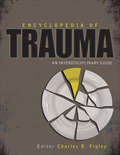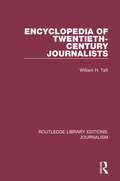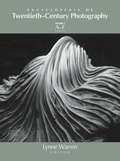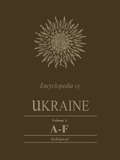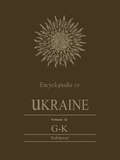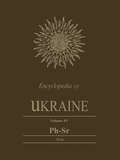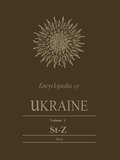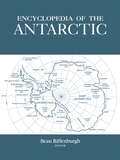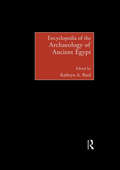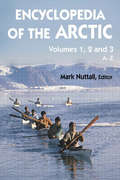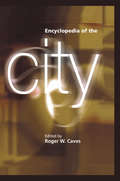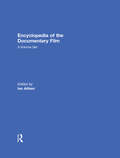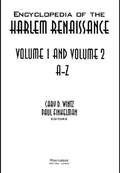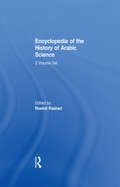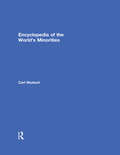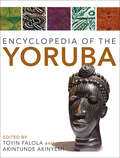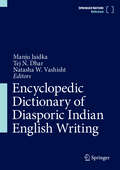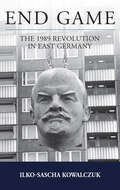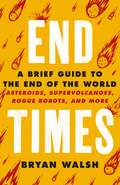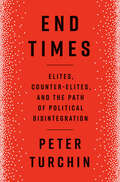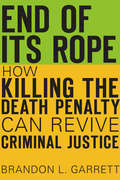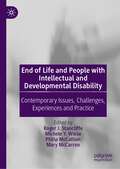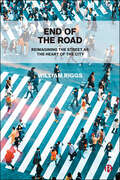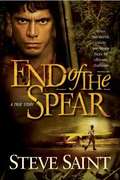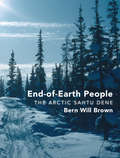- Table View
- List View
Encyclopedia of Trauma: An Interdisciplinary Guide
by Charles R. FigleyTrauma is defined as a sudden, potentially deadly experience, often leaving lasting, troubling memories. Traumatology (the study of trauma, its effects, and methods to modify effects) is exploding in terms of published works and expanding in terms of scope. Originally a narrow specialty within emergency medicine, the field now extends to trauma psychology, military psychiatry and behavioral health, post-traumatic stress and stress disorders, trauma social work, disaster mental health, and, most recently, the subfield of history and trauma, with sociohistorical examination of long-term effects and meanings of major traumas experienced by whole communities and nations, both natural (Pompeii, Hurricane Katrina) and man-made (the Holocaust, 9/11). One reason for this expansion involves important scientific breakthroughs in detecting the neurobiology of trauma that is connecting biology with human behavior, which in turn, is applicable to all fields involving human thought and response, including but not limited to psychiatry, medicine and the health sciences, the social and behavioral sciences, the humanities, and law. Researchers within these fields and more can contribute to a universal understanding of immediate and long-term consequences–both good and bad–of trauma, both for individuals and for broader communities and institutions. Trauma encyclopedias published to date all center around psychological trauma and its emotional effects on the individual as a disabling or mental disorder requiring mental health services. This element is vital and has benefited from scientific and professional breakthroughs in theory, research, and applications. Our encyclopedia certainly will cover this central element, but our expanded conceptualization will include the other disciplines and will move beyond the individual.
Encyclopedia of Twentieth Century Journalists (Routledge Library Editions: Journalism #12)
by William H. TaftOriginally published in 1986. This book is a unique compilation of biographical sketches which covers editors, publishers, photographers, bureau chiefs, columnists, commentators, cartoonists, and artists. Alphabetical entries provide overviews of the lives and personalities of a good cross-section of important people. There is also a short essay on awards and prize winners. Everything is efficiently indexed. This is a supremely useful reference tool for those in mass media and popular culture fields.
Encyclopedia of Twentieth-Century Photography, 3-Volume Set
by Lynne WarrenThe Encyclopedia of Twentieth-Century Photography explores the vast international scope of twentieth-century photography and explains that history with a wide-ranging, interdisciplinary manner. This unique approach covers the aesthetic history of photography as an evolving art and documentary form, while also recognizing it as a developing technology and cultural force. This Encyclopedia presents the important developments, movements, photographers, photographic institutions, and theoretical aspects of the field along with information about equipment, techniques, and practical applications of photography. To bring this history alive for the reader, the set is illustrated in black and white throughout, and each volume contains a color plate section. A useful glossary of terms is also included.
Encyclopedia of Ukraine: A-F plus Map and Gazetteer
by Volodymyr KubijovycOver thirty years in the making, the most comprehensive work in English on Ukraine is now complete: its history, people, geography, economy, and cultural heritage, both in Ukraine and in the diaspora.
Encyclopedia of Ukraine: G-K
by Volodymyr KubijovycThe appearance of Volume II of the Encyclopedia of Ukraine makes the second stage of a major publishing project. Based on twenty-five years' research by more than 100 scholars from around the world, the encyclopedia provides the most essential information about Ukraine and its people, history, geography, economy, and cultural heritage. Volume II contains entries beginning with the letters G to K, among them numerous biographies of historical figures and people currently living in and outside of Soviet Ukraine. Included are some 600 illustrations, maps, and statistical tables. The five volumes of the Encyclopedia of Ukraine will constitute a comprehensive guide to the life and culture of Ukrainians and reflect the manifold relations of Ukrainians with their neighbours and with their non-Ukrainian environments in the various countries to which they immigrated.
Encyclopedia of Ukraine: Ph-Sr
by Danylo Husar StrukOver thirty years in the making, the most comprehensive work in English on Ukraine is now complete: its history, people, geography, economy, and cultural heritage, both in Ukraine and in the diaspora.
Encyclopedia of Ukraine: St-Z
by Danylo Husar StrukOver thirty years in the making, the most comprehensive work in English on Ukraine is now complete: its history, people, geography, economy, and cultural heritage, both in Ukraine and in the diaspora.
Encyclopedia of the Antarctic
by Beau RiffenburghThe Antarctic is unique, geographically, politically, and scientifically. It is the most remote, hostile, and dangerous continent, while at the same time it is the most pristine and least developed. Antarctica is the only major part of the Earth's landmass not directly governed by one nation, but under the control of a Treaty, with a multitude of acceding nations. The Encyclopedia of the Antarctic brings together large quantities of information on the wide variety of factors, issues and individuals influencing and relating to the Antarctic. No comparable book currently exists for this region.The Encyclopedia of the Antarctic discusses scientific activities and topics, but the 'human element' is also a significant part of the work, with entries on history, politics, legal issues, national research programs, scientific bases, historic huts, the United Nation's 'Question of Antarctica,' compliance with the Environmental Protocol, and tourism.
Encyclopedia of the Archaeology of Ancient Egypt
by Kathryn A. BardThe Encyclopedia opens with a general map of the region and a chronology of periods and dynasties, providing a context for the entries. The first section of the volume then comprises 14 overviews which explore the history and significance of each period.The main body of the text offers more than 300 alphabetically organized entries, written by some of the most eminent scholars in this field. Areas covered include:artefacts - glass, jewellery, sculpturearchaeological practices - dating techniques, representational evidence, textual sourcesbiographies - Howard Carter, Gertrude Caton Thompson, Gaston Masperobuildings - cult temples, private tombs, pyramid complexes geographical features - agriculture, climate, irrigationsites - Abydos, Dakhla Oasis, Thebessocial organization - kingship, law, taxationThe text is extensively illustrated with over 120 images. Each entry is followed by a selected further reading section which includes foreign language sources to supplement the available works in English.
Encyclopedia of the Arctic
by Mark NuttallWith detailed essays on the Arctic's environment, wildlife, climate, history, exploration, resources, economics, politics, indigenous cultures and languages, conservation initiatives and more, this Encyclopedia is the only major work and comprehensive reference on this vast, complex, changing, and increasingly important part of the globe. Including 305 maps.This Encyclopedia is not only an interdisciplinary work of reference for all those involved in teaching or researching Arctic issues, but a fascinating and comprehensive resource for residents of the Arctic, and all those concerned with global environmental issues, sustainability, science, and human interactions with the environment.
Encyclopedia of the City
by Roger W. CavesThe Encyclopedia of the City focuses on the key topics encountered by undergraduates and scholars in urban studies and allied fields. Contributors include major theoreticians and practitioners, and on other individuals, groups, and organizations which study the city or practice in a field that directly or indirectly affects the city, the Encyclopedia necessarily adopts an interdisciplinary and multidisciplinary perspective. A solid but also provocative starting point for wider exploration of the city, this is a first-class work of reference that will be an essential resource for independent study as well as a useful aid in teaching.
Encyclopedia of the Documentary Film 3-Volume Set
by Ian AitkenThe Encyclopedia of the Documentary Film is a fully international reference work on the history of the documentary film from the Lumière brothers' Workers Leaving the Lumière Factory (1885) to Michael Moore's Fahrenheit 911 (2004). This Encyclopedia provides a resource that critically analyzes that history in all its aspects. Not only does this Encyclopedia examine individual films and the careers of individual film makers, it also provides overview articles of national and regional documentary film history. It explains concepts and themes in the study of documentary film, the techniques used in making films, and the institutions that support their production, appreciation, and preservation.
Encyclopedia of the Harlem Renaissance
by Paul Finkelman Cary D. WintzFrom the music of Louis Armstrong to the portraits by Beauford Delaney, the writings of Langston Hughes to the debut of the musical Show Boat, the Harlem Renaissance is one of the most significant developments in African-American history in the twentieth century. The Encyclopedia of the Harlem Renaissance, in two-volumes and over 635 entries, is the first comprehensive compilation of information on all aspects of this creative, dynamic period.For a full list of entries, contributors, and more, visit the Encyclopedi a of Harlem Renaissance website.
Encyclopedia of the History of Arabic Science: Volume 3 Technology, Alchemy and Life Sciences
by Roshdi RashedThe Arabic contribution is fundamental to the history of science, mathematics and technology, but until now no single publication has offered an up-to-date synthesis of knowledge in this area. In three fully-illustrated volumes the Encyclopedia of the History of Arabic Science documents the history and philosophy of Arabic science from the earliest times to the present day. The set as a whole covers seven centuries. Thirty chapters, written by an international team of specialists from Europe, America, the Middle East and Russia cover such areas as astronomy, mathematics, music, engineering, nautical science and scientific institutions.
Encyclopedia of the World's Minorities
by Martin Ryle Carl SkutschThis study of minorities involves the difficult issues of rights, justice, equality, dignity, identity, autonomy, political liberties, and cultural freedoms. The A-Z Encyclopedia presents the facts, arguments, and areas of contention in over 560 entries in a clear, objective manner.For a full list of entries, contributors, and more, visit the Encyclopedia of the World's Minorities website.
Encyclopedia of the Yoruba
by Tóyìn Fálọlá and Akíntúndé Akínyẹmí“The encyclopedia gives a complex, yet detailed, presentation of the Yorùbá, a dominant ethnic group in West Africa . . . an invaluable resource.” —Yoruba Studies ReviewThe Yoruba people today number more than thirty million strong, with significant numbers in the United States, Nigeria, Europe, and Brazil. This landmark reference work emphasizes Yoruba history, geography and demography, language and linguistics, literature, philosophy, religion, and art. The 285 entries include biographies of prominent Yoruba figures, artists, and authors; the histories of political institutions; and the impact of technology and media, urban living, and contemporary culture on Yoruba people worldwide. Written by Yoruba experts on all continents, this encyclopedia provides comprehensive background to the global Yoruba and their distinctive and vibrant history and culture.“Readers unfamiliar with the Yoruba will find the introduction a concise and valuable overview of their language and its dialects, recent history, mythology and religion, and diaspora movements . . . Highly recommended.” —Choice
Encyclopedic Dictionary of Diasporic Indian English Writing
by Manju Jaidka Tej N. Dhar Natasha W. VashishtThe Handbook of Diasporic Indian Writing in English is an essential reference to Indian literature. It features alphabetical entries of Indian writers who have bridged the gap between cultures and redefined language boundaries. As the field of diasporic writing continues to expand and intersect with various branches of English and Cultural studies, it anticipates a growing market. It offers a unique and compelling perspective on the global tapestry of literature. It draws on various interdisciplinary approaches, including postcolonial theory, cultural studies, and digital humanities, to offer fresh and innovative perspectives on the literature. It is an indispensable resource for research scholars of literary studies and related disciplines, like cultural studies and postcolonial studies.
End Game: The 1989 Revolution in East Germany (Studies in German History #26)
by Ilko-Sascha KowalczukThe fall of the Berlin Wall, and the chain of events leading up to it, arguably constitute one of the most thoroughly documented episodes in recent history. Nonetheless, most accounts have focused predominantly on high-level politics and diplomacy along with the most dramatic and photogenic public displays. End Game, a rich, sweeping account of the autumn of 1989 as it was experienced “on the ground” in the German Democratic Republic, powerfully depicting the desolation and dysfunction that shaped everyday life for so many East Germans in the face of economic disruption and political impotence. Citizens’ frustration mounted until it bubbled over in the form of massive demonstrations and other forms of protest. Following the story up to the first free elections in March 1990, the volume combines abundant detail with sharp analysis and helps us to see this familiar historical moment through new eyes.
End Times: Asteroids, Supervolcanoes, Plagues and More
by Bryan WalshNewsweek and Bloomberg popular science and investigative journalist Bryan Walsh explores the history of extinction and offers a cutting-edge examination of existential risk, the dangerous mistakes we have yet to pay for, and concrete steps we can take to protect ourselves and future-proof our civilization.What is going to cause our extinction?How can we save ourselves and our future?End Times answers the most important questions facing humankindEnd Times is a compelling work of skilled reportage that peels back the layers of complexity around the unthinkable-and inevitable-end of humankind. From asteroids and artificial intelligence to volcanic supereruption to nuclear war, 15-year veteran science reporter and TIME editor Bryan Walsh provides a stunning panoramic view of the most catastrophic threats to the human race.In End Times, Walsh examines threats that emerge from nature and those of our own making: asteroids, supervolcanoes, nuclear war, climate change, disease pandemics, biotechnology, artificial intelligence, and extraterrestrial intelligence. Walsh details the true probability of these world-ending catastrophes, the impact on our lives were they to happen, and the best strategies for saving ourselves, all pulled from his rigorous and deeply thoughtful reporting and research.Walsh goes into the room with the men and women whose job it is to imagine the unimaginable. He includes interviews with those on the front lines of prevention, actively working to head off existential threats in biotechnology labs and government hubs. Guided by Walsh's evocative, page-turning prose, we follow scientific stars like the asteroid hunters at NASA and the disease detectives on the trail of the next killer virus.Walsh explores the danger of apocalypse in all forms. In the end, it will be the depth of our knowledge, the height of our imagination, and our sheer will to survive that will decide the future.
End Times: Elites, Counter-Elites, and the Path of Political Disintegration
by Peter Turchin&“Peter Turchin brings science to history. Some like it and some prefer their history plain. But everyone needs to pay attention to the well-informed, convincing and terrifying analysis in this book.&” —Angus Deaton, winner of the Nobel Prize in EconomicsFrom the pioneering co-founder of cliodynamics, the groundbreaking new interdisciplinary science of history, a big-picture explanation for America's civil strife and its possible endgamesPeter Turchin, one of the most interesting social scientists of our age, has infused the study of history with approaches and insights from other fields for more than a quarter century. End Times is the culmination of his work to understand what causes political communities to cohere and what causes them to fall apart, as applied to the current turmoil within the United States. Back in 2010, when Nature magazine asked leading scientists to provide a ten-year forecast, Turchin used his models to predict that America was in a spiral of social disintegration that would lead to a breakdown in the political order circa 2020. The years since have proved his prediction more and more accurate, and End Times reveals why.The lessons of world history are clear, Turchin argues: When the equilibrium between ruling elites and the majority tips too far in favor of elites, political instability is all but inevitable. As income inequality surges and prosperity flows disproportionately into the hands of the elites, the common people suffer, and society-wide efforts to become an elite grow ever more frenzied. He calls this process the wealth pump; it&’s a world of the damned and the saved. And since the number of such positions remains relatively fixed, the overproduction of elites inevitably leads to frustrated elite aspirants, who harness popular resentment to turn against the established order. Turchin&’s models show that when this state has been reached, societies become locked in a death spiral it's very hard to exit.In America, the wealth pump has been operating full blast for two generations. As cliodynamics shows us, our current cycle of elite overproduction and popular immiseration is far along the path to violent political rupture. That is only one possible end time, and the choice is up to us, but the hour grows late.
End of Its Rope: How Killing the Death Penalty Can Revive Criminal Justice
by Brandon L. GarrettToday, death sentences in the U.S. are as rare as lightning strikes. Brandon Garrett shows us the reasons why, and explains what the failed death penalty experiment teaches about the effect of inept lawyering, overzealous prosecution, race discrimination, wrongful convictions, and excessive punishments throughout the criminal justice system.
End of Life and People with Intellectual and Developmental Disability: Contemporary Issues, Challenges, Experiences and Practice
by Philip McCallion Roger J. Stancliffe Michele Y. Wiese Mary McCarronThis book on end of life examines how to include people with intellectual and developmental disability in the inevitability of dying and death. Comprising 17 chapters, it addresses challenging and under-researched topics including suicide, do-not-resuscitate, advance care planning, death doulas and accessible funerals. Topics reflect everyday community, palliative care, hospice and disability services.The book proposes that the rights of people with disabilities should be supported up to and after their death. Going beyond problem identification, the chapters offer positive, evidence-supported responses that translate research to practice, together with practice examples and resources grounded in lived experience. The book is applicable to readers from the disability field, and mainstream health professionals who assist people with disability in emergency care, palliative care or end-of-life planning
End of the Road: Reimagining the Street as the Heart of the City
by William RiggsSince the earliest days of civilization, streets have played an important role in shaping society – but what is a street? Is it a living ecosystem, a public space, a social space, an economic space or a combination of these? The focus on automotive travel over the past century has changed the role of streets in cities. This has degraded the quality of urban life and contributed to public health issues. This book offers a unique look at streets as locations that can evolve to support the economic, social, cultural and natural aspects of cities. Using modern urban design examples, it challenges readers to focus not only on the livability and travel benefits of roads, but on how the power of streets can be harnessed. In so doing, it shapes more dynamic spaces for walking, biking and living, and aims to stimulate urban vitality and community regeneration, encouraging policymakers and individuals to make changes in their own communities.
End of the Spear: A True Story
by Steve SaintAsked to return to Ecuador by the same tribe who killed his father and other missionaries 40 years earlier, Saint and his family try to help a Stone Age people transition to the 21st century. Their efforts lead to the discovery of the tribal intrigue behind the murders, resulting in very difficult decisions.
End-of-Earth People: The Arctic Sahtu Dene
by Bern Will BrownA history of the "End-of-Earth" Native people of Canada’s far-North Sahtu region. Bern Will Brown, noted northern author, artist, photographer, and respected community leader living in Colville Lake, Northwest Territories, provides new insights and perspectives on the Sahtu Dene, the people referred to as the "Hareskin" in Alexander Mackenzie’s 1793 journal. Having lived among them for over sixty years and as a speaker of their dialect, Brown is well positioned to provide an adventure in history and culture rooted in the Hareskin traditional way of life. End-of-Earth People, his latest contribution and a valuable record of the North, is a portrait of a people Brown has come to know in ways that anthropologists and ethnologists can only envy.
